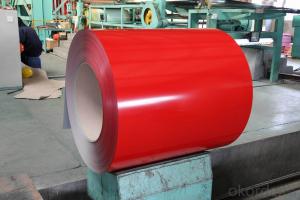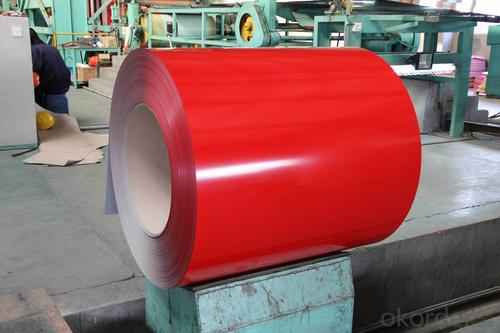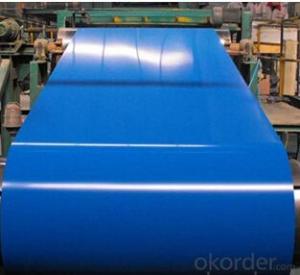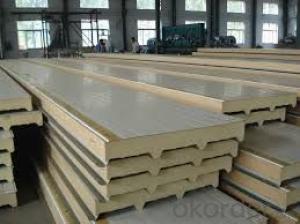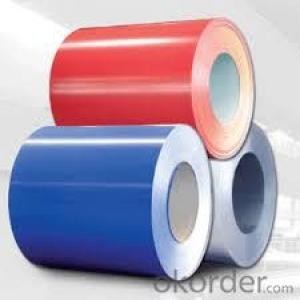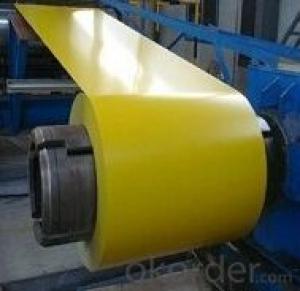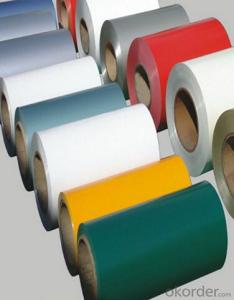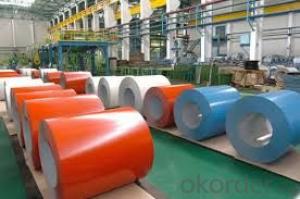printed PPGI Prepainted Steel Coil (color coated steel) with film HDGI
- Loading Port:
- China Main Port
- Payment Terms:
- TT OR LC
- Min Order Qty:
- -
- Supply Capability:
- -
OKorder Service Pledge
OKorder Financial Service
You Might Also Like
Our Advantages
1. more than 10 years experiences in steel business
2. good quality
3. competitive price
4. meet your needs via reprocessing
5. excellent service
6. short delivery time
7. long mutual beneficial business cooperation
8. certificate: ISO9001
Product description:
Thickness: 0.12mm-1.5mm
Width: 762mm-1250mm
Zinc Coating: 60g-200 GSM
Coil ID: 508mm
Tolerance of thickness: ± 0.03mm
Tolerance of width: ± 0.03mm
Hardness: Full hard
Coil Weight: Normally 3-6 mt.
Supply ability: 300, 000Mt/year (MOQ: 50Mt)
Price terms: FOB, CFR, CIF
Payment terms: T/T or 30% T/T for deposit, rest to be paid by IRREVOCABLE L/C at Sight
Deliver time: Within 30 days
Packing: Exporting package standard. Steel strip Water proof paper, metal covers
| Product name | steel coil,galvanized steel coil |
| Material | DX51D, SGCC, SPCC, CGCC, DX51D |
| Normal thickness | 0.17-1.2mm |
| Normal width | 900mm,914mm, 1000mm, 1200mm, 1220mm, 1250mm |
| Coil weight | 3-12ns |
| Certificate | BV & SGS |
| Original | Shandong,China |
| Payment terms | L/C or T/T |
| Delivery time | within 10 ~ 25 days after 30% prepayment |
Furniture:Wardrobe, office equipment, cooking appliance
The transport industry:Automobile components, bicycle parts, body of railway coaches
Other:water tanks, enamel, barrels, tubes, chimney, grain barn, stamping, cable wrapper, billboards, safety signs, pools
- Q: What are the common coil width tolerances?
- The common coil width tolerances vary depending on the industry and specific application. However, typical coil width tolerances range from +/- 0.005 to 0.030 inches.
- Q: What are the common methods of forming steel coils?
- There are several common methods for forming steel coils, each with its own unique advantages and applications. The most common method is known as hot rolling. This involves heating a large steel slab to a high temperature and passing it through a series of rollers to reduce its thickness. The steel is then coiled into a large, continuous roll. Hot rolling is typically used for producing steel coils with a consistent thickness and a smooth surface finish. It is commonly used in industries such as automotive, construction, and manufacturing. Another method is cold rolling, which is similar to hot rolling but is performed at room temperature. Cold rolling involves passing the steel through a set of rollers to further reduce its thickness and improve its surface finish. This process is often used to produce steel coils with precise dimensions and excellent mechanical properties. Cold-rolled steel coils are commonly used in applications that require high strength, such as in the production of appliances, electrical components, and structural components. A third method is known as galvanizing. This involves coating the steel coil with a layer of zinc to protect it from corrosion. The steel coil is first cleaned and then immersed in a bath of molten zinc. The zinc adheres to the surface of the steel, forming a protective layer. Galvanized steel coils are widely used in outdoor applications, such as roofing, fencing, and automotive parts, due to their excellent corrosion resistance. Lastly, there is the electro-galvanizing method. This process involves applying a thin layer of zinc to the surface of the steel coil through an electroplating process. The steel coil is immersed in an electrolyte solution and an electric current is passed through it, causing the zinc to deposit onto the surface of the steel. Electro-galvanized steel coils are commonly used in industries that require a smooth and aesthetically pleasing finish, such as in the production of appliances, automotive parts, and decorative items. Overall, these common methods of forming steel coils provide a wide range of options for different applications and requirements. Whether it is hot rolling, cold rolling, galvanizing, or electro-galvanizing, each method offers unique benefits in terms of strength, durability, surface finish, and corrosion resistance.
- Q: When i was 15 i got caught steeling at Super A yes i know i cant believe it. They didnt call the cops or anything they released me to my aunt they took my name and adress and everythimg they said it wouldnt be on my record. But I'm not so sure. Will it be on my record if they didn't call the cops?i live in california. Is there any way i can check my record?
- Steeling? What's that? Did you take a piece of steel and weld it? I am confused?
- Q: How much do steel coils weigh?
- The weight of steel coils can vary depending on several factors such as the thickness, width, and length of the coil, as well as the specific type of steel being used. Generally, steel coils can weigh anywhere from a few hundred pounds to several tons. It is important to note that steel coils are typically measured in terms of their weight per unit area, known as the coil's "basis weight" or "coil weight".
- Q: How do steel coils contribute to the HVACR equipment industry?
- Steel coils are an essential component in the HVACR equipment industry as they are used in various applications such as heat exchangers, condenser coils, and evaporator coils. These coils provide a durable and efficient solution for transferring heat, ensuring optimal performance and energy efficiency of HVACR systems. Additionally, steel coils offer excellent corrosion resistance, allowing them to withstand harsh environmental conditions and extend the lifespan of the equipment. Overall, steel coils play a crucial role in enhancing the functionality and longevity of HVACR equipment.
- Q: How are steel coils stored in warehouses?
- Steel coils are typically stored in warehouses by stacking them horizontally on top of each other, often using specialized racks or shelves designed to support their weight. Coils are usually aligned in rows with adequate space between each stack to allow for easy access and movement of the coils. Additionally, some warehouses may use protective materials, such as wooden or plastic spacers, to prevent scratching or damage to the coils during storage.
- Q: What are the potential dangers of handling steel coils?
- There are several potential dangers associated with handling steel coils. Firstly, steel coils are heavy and can pose a risk of physical injury if not handled properly. The weight of the coils can cause strains, sprains, or even more serious injuries if dropped or mishandled. This is particularly true when using manual lifting equipment or when attempting to move the coils without proper training or assistance. Secondly, steel coils often have sharp edges or protruding parts that can cause cuts or puncture wounds if not handled with care. These sharp edges can be especially hazardous when attempting to manipulate or position the coils during transportation or storage. It is important to wear appropriate personal protective equipment, such as gloves, to minimize the risk of injury. In addition, steel coils can become unstable if not adequately secured or balanced. Improper stacking or storage of the coils can lead to them shifting or falling, potentially causing serious injuries or damage. It is crucial to follow proper stacking and storage procedures, including using appropriate equipment and supports, to ensure stability and prevent accidents. Furthermore, steel coils are often stored in areas with limited space or uneven surfaces, increasing the risk of trips, falls, or collisions. It is essential to maintain clear and well-organized storage areas, free of obstacles or hazards, to reduce the likelihood of accidents. Lastly, steel coils can be subject to corrosion or rust, which can weaken the metal and compromise their structural integrity. This can increase the risk of the coils collapsing or breaking during handling, potentially causing injuries or damage to property. Regular inspections and maintenance of the coils, as well as proper storage in dry and well-ventilated areas, can help mitigate this risk. Overall, the potential dangers of handling steel coils include physical injuries from their weight and sharp edges, instability during transportation or storage, accidents due to limited space or uneven surfaces, and the risk of structural failure due to corrosion or rust. It is crucial to follow proper safety protocols, receive appropriate training, and use the necessary equipment to minimize these risks and ensure safe handling of steel coils.
- Q: What are the applications of steel coils in automotive manufacturing?
- Steel coils have a wide range of applications in automotive manufacturing due to their unique properties and characteristics. They are commonly used in various parts and components of vehicles, offering numerous benefits and contributing to the overall performance, safety, and reliability of automobiles. One of the primary applications of steel coils in automotive manufacturing is in the production of body panels. Steel coils are used to create the outer body structure of vehicles, including doors, hoods, fenders, and roofs. The high strength and durability of steel make it an ideal material for these components, as it provides protection against impacts and enhances the overall structural integrity of the vehicle. Steel coils are also used in the manufacturing of automotive chassis and frames. The strong and rigid nature of steel makes it an excellent choice for these critical components, as it can withstand heavy loads and provide stability to the vehicle. Steel coils ensure that the chassis and frames have the necessary strength and stiffness to support the weight of the vehicle and withstand the forces experienced during driving. Moreover, steel coils are utilized in the production of various suspension and steering components, such as springs, stabilizer bars, and control arms. These components require high strength and resistance to fatigue, as they are subjected to constant stress and vibrations. Steel coils provide the necessary toughness and flexibility to these parts, ensuring smooth and controlled vehicle handling. In addition, steel coils are used in the manufacturing of engine parts and exhaust systems. The high-temperature resistance and corrosion resistance of steel make it an ideal material for these applications. Steel coils are formed into various shapes, such as tubes and pipes, and used to create exhaust manifolds, catalytic converters, and mufflers. They play a crucial role in improving the performance and efficiency of the engine, as well as reducing harmful emissions. Overall, steel coils are vital in automotive manufacturing due to their strength, durability, and versatility. They are used in the production of body panels, chassis, suspension components, engine parts, and exhaust systems. The use of steel coils in these applications ensures that vehicles are safe, reliable, and perform optimally, making them an indispensable material in the automotive industry.
- Q: can u use stainless steel to make a coin? why or why not? answers based on facts plz.
- Stainless steel has been used by some countries to make coins, but it's not an ideal metal. When a coin is struck, a die comes down and strikes the blank with many tons of force (the blank is also sitting on top of another die--one has the image on the obverse (front) of the coin, while the other die has the image of the reverse of the coin). When the die strikes the blank, the force causes the metal in the blank to flow into the recesses of the die. The problem with stainless steel is that it doesn't want to flow into the die. To get an image, either the relief (how high the raised portion of the design will be) has to be very low, and the coin has to have a simple design, or they have to greatly increase the pressure of the strike. This slows the coining press down, and greatly shortens the life of the dies.
- Q: steel welding with ms steel iron
- Welding austenitic stainless steels to carbon and low alloy steels are established methods in the process and construction industries. Dissimilar metal welds involving stainless steels can be done using most full fusion weld methods, including TIG (Tungsten Inert Gas) and MIG (Metal Inert Gas). Weld procedures using filler (consumable) enable better control of joint corrosion resistance and mechanical properties. In selecting the weld filler, the joint is considered as being stainless, rather than the carbon steel. Over-alloyed fillers are used to avoid dilution of the alloying elements in the fusion zone of the parent stainless steel.
Send your message to us
printed PPGI Prepainted Steel Coil (color coated steel) with film HDGI
- Loading Port:
- China Main Port
- Payment Terms:
- TT OR LC
- Min Order Qty:
- -
- Supply Capability:
- -
OKorder Service Pledge
OKorder Financial Service
Similar products
Hot products
Hot Searches
Related keywords
